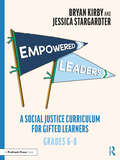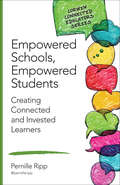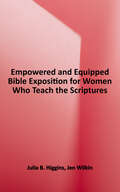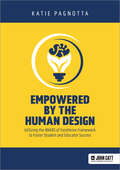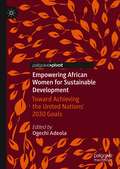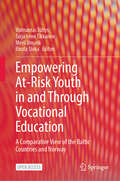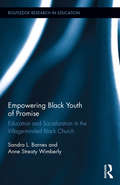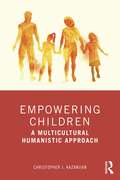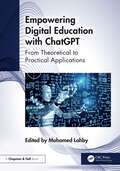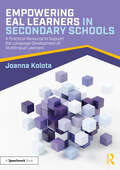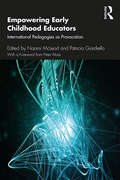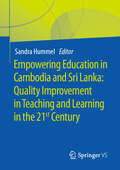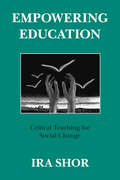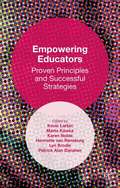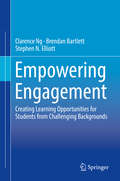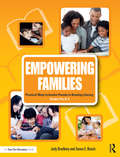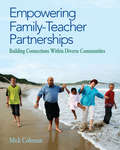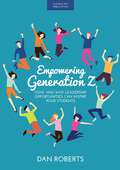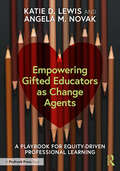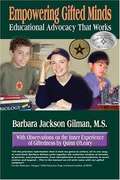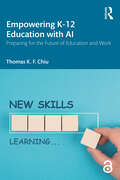- Table View
- List View
Empowered Leaders: A Social Justice Curriculum for Gifted Learners, Grades 6-8
by Bryan Kirby Jessica StargardterEmpowered Leaders provides educators with a practical guide for incorporating critical social justice themes into enrichment programming for gifted students in grades 6-8. Featuring options for differentiation, digital learning, and talent development, each chapter offers detailed lesson plans and activities based around grade level themes that build as the students progress through middle school. Accessible and reader-friendly, lessons are student-centered and designed to foster globally conscious thought, empathetic discourse, and sustainable problem-solving skills. Ideal for individual, co-teaching, or small group programs, this helpful resource equips teachers with the tools to incorporate social justice into any subject or classroom. National Association for Gifted Children (NAGC) Curriculum Network Annual Curriculum Award 2020
Empowered Schools, Empowered Students: Creating Connected and Invested Learners (Corwin Connected Educators Series)
by Pernille S. RippOpen up a new world of learning and engage students with these powerful ideas! This book helps you empower teachers and students to regain control of their own teaching and learning journey. With this helpful guide, cultivate enthusiasm for learning by changing the power dynamic and putting the reins back into the hands of students. Administrators and teachers learn to: Cultivate the experts at your school Create an environment of trust and collaboration Give students and staff a voice Includes real-life stories from other connected educators! Transform the learning experience and create lasting change with this breakthrough volume of the Connected Educators Series! The Corwin Connected Educators series is your key to unlocking the greatest resource available to all educators: other educators. Being a Connected Educator is more than a set of actions: it’s a belief in the potential of technology to fuel lifelong learning. "Pernille has shared what it takes to create an environment that nurtures growth for students and staff." —Nicholas Provenzano, The Nerdy Teacher TheNerdyTeacher.com @TheNerdyTeacher "Pernille makes a case for the need to change from a traditional hierarchical approach of control to a shared, empowering approach. This book outlines steps that administrators can take to share leadership in their schools and teachers can take to share the responsibility of learning with the students." —William Chamberlain, Teacher Noel Elementary School
Empowered Schools, Empowered Students: Creating Connected and Invested Learners (Corwin Connected Educators Series)
by Pernille S. RippOpen up a new world of learning and engage students with these powerful ideas! This book helps you empower teachers and students to regain control of their own teaching and learning journey. With this helpful guide, cultivate enthusiasm for learning by changing the power dynamic and putting the reins back into the hands of students. Administrators and teachers learn to: Cultivate the experts at your school Create an environment of trust and collaboration Give students and staff a voice Includes real-life stories from other connected educators! Transform the learning experience and create lasting change with this breakthrough volume of the Connected Educators Series! The Corwin Connected Educators series is your key to unlocking the greatest resource available to all educators: other educators. Being a Connected Educator is more than a set of actions: it’s a belief in the potential of technology to fuel lifelong learning. "Pernille has shared what it takes to create an environment that nurtures growth for students and staff." —Nicholas Provenzano, The Nerdy Teacher TheNerdyTeacher.com @TheNerdyTeacher "Pernille makes a case for the need to change from a traditional hierarchical approach of control to a shared, empowering approach. This book outlines steps that administrators can take to share leadership in their schools and teachers can take to share the responsibility of learning with the students." —William Chamberlain, Teacher Noel Elementary School
Empowered and Equipped: Bible Exposition for Women Who Teach the Scriptures
by Julia B. HigginsMen and women alike are given the spiritual gift of teaching, yet few resources are designed specifically for women who exposit the Scriptures. In Empowered and Equipped, Julia Higgins steers women through the steps needed to faithfully interpret, apply, and teach a passage of Scripture. By examining both the principles and practices of teaching Bible exposition, Higgins seeks to prepare women in the local church to make and mold disciples.
Empowered by the Human Design: Utilizing the BBARS of Excellence Framework to Foster Student and Educator Success
by Katie PagnottaYouth mental health challenges are on the rise. The educator attrition rate is leaving schools scrambling to fill positions. And everyone is on information overload. As a school counselor, Katie Pagnotta saw these statistics in action and was compelled to create a resource that would synthesize best practices in a way that not only eased the role of the educators but ignited joy within the job. And in doing so, educators would be more aptly positioned to support the needs of all students!Empowered by the Human Design is the culmination of Katie's passion, experience, and research. It takes historically fragmented best-practice initiatives such as social emotional learning, trauma-responsive care, mental health literacy, and equity and integrates them into one framework, Brain- and Body- Aligned Responsive Systems (BBARS) of Excellence. The BBARS of Excellence framework is grounded in evidence-based approaches and strategies within the fields of education, psychology, and neuroscience. Gathering 18 professionals from these respective fields, the author expertly weaves their interviews throughout the book to showcase a tapestry of collective wisdom. Empowered by the Human Design masterfully highlights the research and science behind the framework and then turns the concepts into simple and practical application strategies that educators can implement immediately. This book is an educator survival guide to emerge from challenges as a more resilient, joyful teacher who fosters connection, belonging, and engagement for students.
Empowered by the Human Design: Utilizing the BBARS of Excellence Framework to Foster Student and Educator Success
by Katie PagnottaYouth mental health challenges are on the rise. The educator attrition rate is leaving schools scrambling to fill positions. And everyone is on information overload. As a school counselor, Katie Pagnotta saw these statistics in action and was compelled to create a resource that would synthesize best practices in a way that not only eased the role of the educators but ignited joy within the job. And in doing so, educators would be more aptly positioned to support the needs of all students!Empowered by the Human Design is the culmination of Katie's passion, experience, and research. It takes historically fragmented best-practice initiatives such as social emotional learning, trauma-responsive care, mental health literacy, and equity and integrates them into one framework, Brain- and Body- Aligned Responsive Systems (BBARS) of Excellence. The BBARS of Excellence framework is grounded in evidence-based approaches and strategies within the fields of education, psychology, and neuroscience. Gathering 18 professionals from these respective fields, the author expertly weaves their interviews throughout the book to showcase a tapestry of collective wisdom. Empowered by the Human Design masterfully highlights the research and science behind the framework and then turns the concepts into simple and practical application strategies that educators can implement immediately. This book is an educator survival guide to emerge from challenges as a more resilient, joyful teacher who fosters connection, belonging, and engagement for students.
Empowering African Women for Sustainable Development: Toward Achieving the United Nations' 2030 Goals
by Ogechi AdeolaThis edited volume assesses the progress that sub-Saharan African countries have made towards gender equality and offers strategies that can be used to empower African women to contribute to the fulfilment of the United Nations’ (UN) 2030 sustainable development goals (SDGs). The contributing authors consider the goals identified during the 1995 United Nations World Conference on Women and the 2015 UN World Conference on Sustainable Development in New York—including no poverty, healthy life, quality education, gender equality, peace and justice, reduced inequalities, and decent work and economic growth—and document the advances made on these goals, with a special emphasis on African women’s experiences. They provide innovative ideas for accelerating achievement of the SDGs and address challenges and opportunities in tourism, business, politics, entrepreneurship, academia, financial inclusion, and the digital gender divide. This book will be of value to policymakers, non-profit organisations focused on gender equality and sustainable development, and academics and scholars who teach and study gender-related issues in the African continent.
Empowering At-Risk Youth in and Through Vocational Education: A Comparative View of the Baltic Countries and Norway
by Vidmantas Tūtlys Tarja Irene Tikkanen Meril Ümarik Biruta SlokaThis open access book presents insights on the resiliency strategies of at-risk vocational education and training (VET) students in the field of learning, employment and social integration, in the Baltic countries and Norway. It investigates the ways in which vocational education and training (VET) can enhance the social inclusion of young people at-risk, both in terms of combating school dropout rates, and promoting transitions between various (social) learning contexts, such as school-work transition. Book presents the findings of the analysis of available statistical data disclosing the capacities and potential of the VET systems and providers to empower vulnerable learners in the project partner countries. In the context of VET, this book examines the situations of at-risk young people as they experience, and understand themselves, in it, and explores innovative solutions to address their challenges in collaboration between themselves, their teachers, and other community actors and stakeholders. Finally, it analyses and discusses the innovative pedagogical interventions used in empowering at-risk VET students as implemented in the research project 'EmpowerVET', on the basis of the Educational Learning Lab model developed by researchers from the University of Tallinn School of Educational Sciences.
Empowering Black Youth of Promise: Education and Socialization in the Village-minded Black Church (Routledge Research in Education)
by Sandra L. Barnes Anne Streaty WimberlyInformed by the experiences of 772 Black churches, this book relies on a multidisciplinary, mixed-methodological lens to examine how today’s Black churches address the religious and non-religious educational and broader socialization needs of youth. Drawing from a cultural and ecological framework of village-mindedness, Barnes and Wimberly examine the intersected nature of place, space, and race to propel a conversation about whether and how the Black Church can become a more relevant and empowering presence for youth and the Black community.
Empowering Children: A Multicultural Humanistic Approach
by Christopher J. KazanjianThis unique text bridges multiculturalism and humanistic psychology, demonstrating how these areas can be effectively integrated to provide a foundation for engaging youth in the global community. Adapting the tenets of humanistic psychology for a modern, multicultural audience, Empowering Children: A Multicultural Humanistic Approach uses an after-school program called Kidz n’ Coaches to exemplify the ways in which community out-reach and humanistic psychology can be used together to meet the needs of diverse populations. Chapters also discuss issues of border cultures, with a focus on communities along the Mexican-American border, and offer practical tools for those looking to found their own community out-reach programs. Through a detailed case study and phenomenological study results, this book offers an immersive framework for multicultural humanistic psychology that will be of value to researchers and professionals alike.
Empowering Digital Education with ChatGPT: From Theoretical to Practical Applications
by Mohamed LahbyRecently, there has been a significant increase in the development and interest in applying generative AI across various domains, including education. The emergence of large language models (LLMs), such as the ChatGPT tool, fueled by advancements in generative AI, is profoundly reshaping education. The use of the ChatGPT tool offers personalized support, improves accessibility, and introduces innovative methods for students and educators to engage with information and learning materials. Furthermore, ChatGPT facilitates a wide range of language learning services, including language instruction, speech recognition, pronunciation feedback, and immersive virtual simulations for hands-on learning experiences.This book explores the transformative potential of the ChatGPT tool within education, shedding light on the opportunities that arise through the integration of the ChatGPT tool into various aspects of the learning process. It serves as a platform for the community to share cutting-edge research ideas concerning the use of the ChatGPT tool in digital education. Readers will discover how the ChatGPT tool can enhance student engagement, foster personalized learning experiences, facilitate intelligent tutoring systems, support virtual classroom interactions, and revolutionize assessment and feedback mechanisms.
Empowering EAL Learners in Secondary Schools: A Practical Resource to Support the Language Development of Multilingual Learners
by Joanna KolotaOne in five students are identified as speaking English as an Additional Language (EAL) and all teachers are highly likely to be teaching multilingual students in their classrooms. As our schools become more culturally and linguistically diverse, they must respond to the needs of the students in front of them, and this book provides a range of strategies and resources to ensure teaching is adaptive and responsive so that all learners thrive and fulfil their academic potential.At the heart of the book is developing an understanding of how languages are acquired and an awareness that all students, regardless of their current English language proficiency, need to be offered a challenging and supportive environment. Chapters offer: High-yielding, practical approaches and strategies to ensure that students are able to access content-appropriate lessons and simultaneously develop their language A plethora of resources and step-by-step examples, showcasing how explicit vocabulary and grammar learning can be context-based for the benefit of all learners Each teacher is positioned as a language teacher, with the responsibility of planning sessions where language is not perceived as an add-on, but as an integral and pivotal part. This book will empower you as an educator and ensure that your classroom is a language-aware and stimulating environment for your students. It will be essential reading for all secondary school educators and teaching assistants who support EAL students in mainstream lessons and are responsible for producing resources and implementing classroom strategies.
Empowering Early Childhood Educators: International Pedagogies as Provocation
by Patricia Giardiello Naomi McLeodThis forward-thinking text challenges educators to think about and question the purpose of education and explores international understandings of the role played by early years professionals in promoting participatory, ethical and reflexive practice which benefits children as independent decision-makers. By exploring the different perspectives, concepts and practices adopted in early childhood settings in Denmark, Finland, Aotearoa, New Zealand and Sweden, Empowering Early Childhood Educators demonstrates the potential of participatory and democratic approaches in day-to-day practice. Illustrating how pedagogical approaches such as Te Whāriki, Reggio Emilia and the Montessori method may be understood and interpreted to maximise children’s engagement in their socio-cultural context, chapters empower educators to question their professional experience, knowledge and initiative to find a balance between directives and ethical practice. A rich combination of case studies, commentaries, interviews and conversations, the text offers critical insight into the daily practices and challenges of early years educators around the world and inspires critical reflection on practices which empower them. A powerful revaluation of the purposes and value of early childhood education, Empowering Early Childhood Educators will be of interest to early years practitioners, students and researchers.
Empowering Education in Cambodia and Sri Lanka: Quality Improvement in Teaching and Learning in the 21st Century (Doing Higher Education)
by Sandra HummelThe anthology offers a distinctive perspective on a European Union-funded capacity-building initiative aimed at enhancing contemporary teaching competencies, with a specific emphasis on Sri Lanka and Cambodia. It discusses the augmentation of pedagogical skills and its consequential effects on both individual and societal levels. Furthermore, the anthology scrutinizes the collaborative efforts in international education, elucidating the strategies adopted to confront the challenges and leverage the opportunities encountered by higher education institutions.
Empowering Education: Critical Teaching for Social Change
by Ira ShorIra Shor is a pioneer in the field of critical education who for over twenty years has been experimenting with learning methods. His work creatively adapts the ideas of Brazilian educator Paulo Freire for North American classrooms. In Empowering Education Shor offers a comprehensive theory and practice for critical pedagogy. For Shor, empowering education is a student-centered, critical and democratic pedagogy for studying any subject matter and for self and social change. It takes shape as a dialogue in which teachers and students mutually investigate everyday themes, social issues, and academic knowledge. Through dialogue and problem-posing, students become active agents of their learning. This book shows how students can develop as critical thinkers, inspired learners, skilled workers, and involved citizens. Shor carefully analyzes obstacles to and resources for empowering education, suggesting ways for teachers to transform traditional approaches into critical and democratic ones. He offers many examples and applications for the elementary grades through college and adult education.
Empowering Educators: Proven Principles And Successful Strategies
by Karen Noble Kevin Larkin Patrick Danaher Marta Kawka Lyn Brodie Henriette RensburgEducators cannot empower their students without being empowered themselves. This book presents a number of proven principles and successful strategies that have been demonstrated by rigorous research to be effective in assisting teachers to carry out their fundamental mission of helping their students to achieve significant learning outcomes.
Empowering Engagement: Creating Learning Opportunities for Students from Challenging Backgrounds
by Stephen N. Elliott Clarence Ng Brendan BartlettThis book examines promoting engagement for children and adolescents from challenging contexts or who are dealing with challenging conditions. The volume concentrates on three vulnerable groups: marginalized youths who have experienced repeated exclusion and sought their second chance in alternative education; children who are coming from economically, culturally, and linguistically disadvantaged backgrounds; and students with social or emotional issues. It defines engagement as evolving over the course of learning, an interpersonal as well as personal process involving students, learning environment, teachers, and peers. Chapters identify the complex personal, sociocultural, economic, and systemic barriers that keep these vulnerable students from fully engaging in school, and explore the enabling role of collaborative and supported learning activities in building academic success and a foundation for productive adult lives. In addition, chapters present instructional practices based on engagement enablers. Chapters also pinpoint specific learning skills and subject areas that can provide openings for promoting motivation and participation. Featured topics include: The importance of cognitive and social enablers for promoting learning engagement.Engagement in instruction from teachers and testing within classrooms.Student voice and perspective as a reading engagement enabler.Promoting academic engagement and aspiration for challenging and advanced mathematics.Alternative educational programs for re-engaging marginalized youths who “don’t fit”.Empowering Engagement is a must-have resource for researchers, scientist-practitioners, clinicians, and graduate students in the fields of child and school psychology, educational policy and politics, social work, motivation and learning, schooling and pedagogies, and related disciplines.
Empowering Families: Practical Ways to Involve Parents in Boosting Literacy, Grades Pre-K–5
by Judy Bradbury Susan E. BuschThe home–school connection is important to student literacy achievement. However, it can be time-consuming to develop and implement programming that keeps families engaged and involved. Empowering Families makes it easier to accomplish these goals! Chock-full of step-by-step plans for arranging a variety of parent/caregiver meetings and literacy booster events, the book enables educators to get families involved in their children’s learning in ways that are fun and non-intimidating. By hosting these events at your school, you’ll be empowering families to… read aloud to their children at home; minimize the summer slide; encourage male involvement in literacy; help their children avoid homework hassles; and much, much more! Bonus: The book includes ready-to-use handouts for your events, such as announcement sheets, follow-up evaluations, and tipsheets that describe ways parents can reinforce literacy at home. These handouts are photocopiable and the tipsheets are also available for easy download from our website at www.routledge.com/9781138803114. Spanish versions of the tipsheets are available on our website as well.
Empowering Family-Teacher Partnerships: Building Connections Within Diverse Communities
by Mick ColemanEmpowering Family-Teacher Partnerships: Building Connections Within Diverse Communities by Thomas M. Coleman prepares students to work collaboratively with families and community professionals in support of children's early education and development. The author takes a student-centered approach to delivering substantive information and framing activities. Students are invited to develop a personal philosophy of family involvement to guide their work with families and to join a community of learners in relying upon their collective insights and problem-solving skills to address family involvement challenges.
Empowering Generation Z: How And Why Leadership Opportunities Can Inspire Your Students
by Dan RobertsDan Roberts, Headteacher of Devonport High School for Boys in Plymouth, believes it is crucial to empower young people to take control of their future.By building the right culture and environment, educators can help ensure that children can truly flourish and develop into adults that wish to have a positive impact on their local, national and international communities.Crisp, captivating and authentic, the book suggests fresh and practical new ideas and opportunities both within the classroom and outside.Dan Roberts' passion for young people is unmistakable, whether speaking before a TED London audience or advising the Obama administration as part of their education technology reform 2020 plan.
Empowering Generation Z: How And Why Leadership Opportunities Can Inspire Your Students
by Dan RobertsDan Roberts, Headteacher of Devonport High School for Boys in Plymouth, believes it is crucial to empower young people to take control of their future.By building the right culture and environment, educators can help ensure that children can truly flourish and develop into adults that wish to have a positive impact on their local, national and international communities.Crisp, captivating and authentic, the book suggests fresh and practical new ideas and opportunities both within the classroom and outside.Dan Roberts' passion for young people is unmistakable, whether speaking before a TED London audience or advising the Obama administration as part of their education technology reform 2020 plan.
Empowering Gifted Educators as Change Agents: A Playbook for Equity-Driven Professional Learning
by Katie D. Lewis Angela M. NovakThrough an accessible, research-based program of professional learning, this critical resource empowers gifted educators to become change agents for equity in their classroom, school, or district. Designed for practitioners seeking to increase the rate of identification and retention of underserved gifted populations, this book guides readers through the Four Zones of Equity-Driven Professional Learning Model, a practical set of tools specific to the field of gifted education. Readers will develop an all-inclusive professional learning plan specific to their teachers’ understanding of cultural norms, guiding participants to gain insight into the characteristics of gifted marginalized students, coaching faculty in ways to increase classroom support, and equipping educators with the tools necessary to build effective partnerships with parents and communities. Ideal for gifted educators, coordinators, and administrators, this playbook is packed with practical ideas, strategies, and activities to bring meaningful, equity-driven professional learning to life.
Empowering Gifted Educators as Change Agents: A Playbook for Equity-Driven Professional Learning
by Katie D. Lewis Angela M. NovakThrough an accessible, research-based program of professional learning, this critical resource empowers gifted educators to become change agents for equity in their classroom, school, or district.Designed for practitioners seeking to increase the rate of identification and retention of underserved gifted populations, this book guides readers through the Four Zones of Equity-Driven Professional Learning Model, a practical set of tools specific to the field of gifted education. Readers will develop an all-inclusive professional learning plan specific to their teachers’ understanding of cultural norms, guiding participants to gain insight into the characteristics of gifted marginalized students, coaching faculty in ways to increase classroom support, and equipping educators with the tools necessary to build effective partnerships with parents and communities.Ideal for gifted educators, coordinators, and administrators, this playbook is packed with practical ideas, strategies, and activities to bring meaningful, equity-driven professional learning to life.
Empowering Gifted Minds
by Quinn O'Leary Barbara Jackson Gilman Linda Kreger SilvermanThe definitive manual on gifted advocacy, this book takes parents and teachers from documenting a child's abilities to providing reasonable educational options year by year.
Empowering K-12 Education with AI: Preparing for the Future of Education and Work
by Thomas K. ChiuThomas Chiu’s book is one of the first to look at the impacts of artificial intelligence (AI) on K-12 education in two areas: AI education, and AI in education. AI education refers to teaching AI, and AI in education refers to using AI to support learning and teaching.Chiu examines the opportunities and challenges of these impacts for teachers and students, proposes a framework and a set of principles for the two areas with examples, and suggests learning outcomes. AI in K-12 education is one of the most important global strategic initiatives since it has made and continues to make impacts on education and the job market. Including AI technology and topics in K-12 education not only helps children understand what AI technologies are and how they work, but also inspires future workplace readiness and potential AI researchers, ethical designers, and software developers. However, educators and AI experts in general realize that planning AI-related education is very challenging. It involves integrating the topics or technologies into the curriculum, necessitating teacher development to address the gaps in knowledge, addressing educational inequity, and securing equipment and resources. Understanding student and teacher opportunities and challenges is crucial.This book is an essential and thought-provoking read for researchers, teacher educators, and school teachers and leaders who wish to embrace AI to prepare K-12 students for their future education and the workforce.
